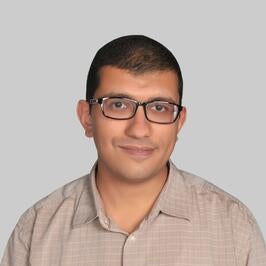
Amr Magdy began dabbling in computers at age 13, in Alexandria, Egypt, on a desktop Pentium 2 that ran Windows 95 with no Internet.

“I would say, ‘This is a magical box’,” said Magdy, an assistant professor of Computer Science and Engineering at the UC Riverside Marlan and Rosemary Bourns College of Engineering. “Twenty-five years ago for a middle-school kid, the technology was very appealing.”
Today, it still is. After years of work in computer engineering, Magdy has earned the most prestigious honor in the nation for early-career science professors: the Faculty Early Career Development (CAREER) Award from the National Science Foundation.
“It feels like you realized a dream you (had) for the past five or six years,” Magdy said of the award, which recognizes young scientists for their emerging leadership in combining research and education.
Starting this year, the award confers a five-year grant totaling $531,707 to advance Magdy’s research. Most of the funds will pay graduate students to support work that explores digital oceans of location-based data, extracting insights that improve people’s lives.
Magdy coordinates with social scientists – who, in turn, work with governments, policymakers, and businesses – to find patterns in location data from sources such as people, phones and cars and stationary objects such as trees and mountains.
The patterns can help policy-makers direct services to underserved communities, aid first responders in reacting to emergencies, and guide companies in locating jobs, products, and services. The algorithms can also improve pandemic response decisions by tracking the spread of disease.
“I’m providing computational tools to help people do their jobs,” Magdy said. His research uses machine learning to boost existing data analysis techniques while also creating “capabilities that were not possible before.”
Such innovation derives from a work ethic born of longtime, steady competition.
It started in high school: After long hours exploring applications, games, and graphics on his Pentium 2, Magdy saw computers as his calling – the challenge being that countless others in his coastal metropolis chose likewise. To earn admission to college computer science programs in Alexandria, a student had to rank near the top of hundreds of thousands of people, he said.
Either way, he was confident in his path: “Over time, my passion didn’t fade out. There is more to know all the time. I thought, ‘This is a topic I won’t get bored of studying.’”
He called that realization a turning point – a prompt that drove him to compete, achieve, and, years later, engineer what could be game-changing science.
After earning a master’s degree in computers and systems engineering at Alexandria University, Magdy earned a master’s and Ph.D. in computer science at the University of Minnesota; did research for Microsoft; and was recruited to Bourns at UCR out of grad school to help found the Center for Geo-Spatial Scientists, a small group of elite researchers specializing in spatial-related research in the United States.
The years of work and competition, from high school to present, have done much to shape the professor’s life lessons and words to live by, which include:
- “Do what you are supposed to do, so you never have room to blame yourself.”
- “Fulfilling dreams comes with time and effort.”
- “Hard work is smarter than smartness; blending them is massive.”
- “In a professional setting, efforts are appreciated, but only results are rewarded.”
Of the first one, he elaborated: “This perspective is really powerful because there are so many variables in life. Things you’re in control of and not in control of. Do your best, and you won’t have room to put the blame on yourself because you did what you could. ‘I did my part.’ No one can (succeed) all the time.”
Outside of academia, Magdy enjoys kicking a soccer ball with friends, visiting Egypt, and spending time with family, including sons Yousof, 10, and Ali, 5.
Part of his time also goes toward teaching undergraduates, who might choose careers as computer engineers themselves. One student recently jotted a message to Magdy atop his 11-page final exam.
The note, in pencil, opens with, “Dear professor, thank you for being so awesome this quarter.”
It closes with, “You are the reason I am still pursuing computer science.”
Of his own path through Alexandria, Minneapolis/St. Paul and Riverside, born of a magical box, Magdy thanked God, family, mentors, and colleagues and said: “I figured out later that the job is much harder than what a teenager in the ’90s could imagine.”